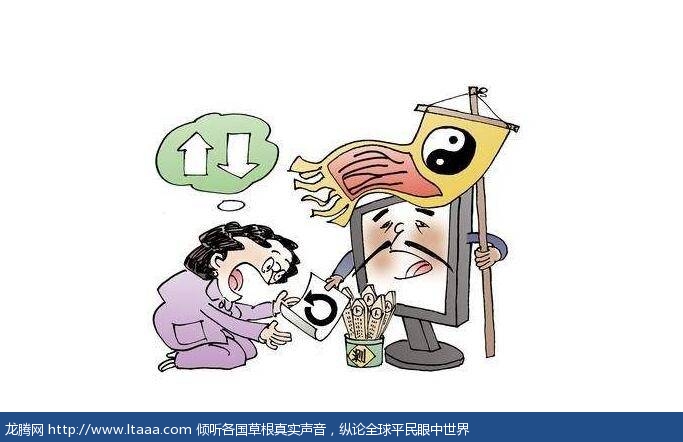哪些中国迷信会让西方人感到吃惊? [美国媒体]
quora网友:一些人将我的评论视为为对中医的评判(中医有热气说法)。我对传统中医抱有崇高敬意并多次从中受益。我只是在谈论这么一种信念,即食物被分成两种类型,吃其中一种会产生特定的负面反应,而通过吃另外一种可以抵消这种反应。事实是你只有相信了热气这种东西你才会因为吃热气食物而产生消极反应,这在很大程度上表明了这只是人们的心理在起作用。中医是另外一回事。
-------------译者:klqw-审核者:龙腾翻译总管------------
What Chinese superstitions would surprise Westerners?
哪些中国迷信会让西方人感到吃惊?
-------------译者:mich-审核者:龙腾翻译总管------------
Scott Deerwester former Senior Systems Analyst at Purdue University (1978-1983)
Written Fri
The one that gets me every time is 热气 (“yit hei” in Cantonese). It literally means “hot air”. In Chinese understanding foods are divided into “cool” (凉) and yit hei foods.[1] So watermelon and beer are “cool”. Anything deep fried or spicy is yit hei. And there’s a whole boatload of things that yit hei foods are supposed to cause - acne and sore throats are two of the major ones.
A person who believes in yit hei will usually be able to tell you whether a food is yit hei or not. And… here’s the surprising part… if somebody believes in it then 10 times out of 10 if they eat something that’s yit hei all of the symptoms show up.
Scientific study of yit hei foods seems to indicate that it approximates how acidic the foods are.[2] I’m personally convinced that’s one part properties of the food and 9 parts placebo effect. Not surprisingly I’ve never experienced any of the symptoms of eating yit hei foods in spite of dire warnings to the contrary on many occasions.
Scott Deerwester 普渡大学前高级系统分析师(1978-1983)
写于周五
有个让我每次都很惊奇是关于 热气,(粤语读“yit hei”)字面翻成是“热呼呼气体”在中国认知里面食物分成“凉食”和 “热食”。
1 西瓜和啤酒是凉的, 任何油炸和辛辣食物都是热气的。还有吃热气食物会导致一系列毛病,主要是喉咙痛和痤疮。
相信热气现象的人通常能够告诉你一种食物是否热气,最让人惊奇的是,如果一个人相信热气,通常他们吃10次热气食物,会有10次出现热气症状。
科学研究表明热气食物大概偏酸性。
2我个人相信是有1成原因是食物的特性和9成是心里暗示。毫不奇怪许多时候我无视恐吓吃下这些热气食物却从来没有出现热气反应。
-------------译者:mich-审核者:龙腾翻译总管------------
Edit
Some folks have interpreted my comments above as a criticism of Chinese traditional medicine (which is also related to yit hei). I have a great deal of respect for Chinese traditional medicine and have benefited from it on a number of occasions. I’m specifically speaking about the belief that foods are grouped into two big classes and that eating foods from the one class will produce specific negative effects that can be countered by eating foods from the other class. The fact that you have to believe in yit hei in order to be negatively affected by eating yit hei foods is a strong indication that it is at least to a large degree in your head. Chinese medicine is another story altogether.
Footnotes
[1] More about 热气
[2] Finally I know how to explain “yeet hay” (热气) to my English friends!
编辑
一些人将我的评论视为为对中医的评判(中医有热气说法)。
我对传统中医抱有崇高敬意并多次从中受益。
我只是在谈论这么一种信念,即食物被分成两种类型,吃其中一种会产生特定的负面反应,而通过吃另外一种可以抵消这种反应。事实是你只有相信了热气这种东西你才会因为吃热气食物而产生消极反应,这在很大程度上表明了这只是人们的心理在起作用。
中医是另外一回事。
脚注:
1 更多关于热气解释
2 我终于知道怎么向英国朋友解释“热气”这个东西了。
-------------译者:yuchen-审核者:龙腾翻译总管------------
Jack Sameuls 1 upvote
Thats the core concept of traditional chinese medicine not a superstition please try to separate the 2
中医这个核心概念不是迷信,请区分好这两者关系
Scott Deerwester
My apologies if I offended you. I have great respect for Chinese medicine. I was speaking specifically about the division of foods into “hot” and “cool” and the attribution of negative effects to eating foods in these two classes. Your inference that my comments extend to the use of these concepts in traditional Chinese medicine is unwarranted.
如果我冒犯了你,我道歉。我非常敬重中医,我只是针对性地谈谈将食物分类成“热”与“寒”以及吃这两类食物的消极影响。你的推论是我的评论涉及到了传统中医对这些概念的使用,这是没有根据的。
Dingqi Zhang 1 upvote
What you say is not superstition. It's Chinese medicine that proves to work well. Neither is it Chinese medicine overextended.
你说的这些不是迷信,它们是已证明运转得很好的中医(理论),而不是什么中医(理论)的过分延伸。
-------------译者:龙腾翻译总管-审核者:龙腾翻译总管------------
Claudia Segger
Written Sat
The post-childbirth restrictions: No showering for a month. No cold drinks. No hot drinks. No spicy food. No raw fruits or vegetables. No housework in fact no work of any kind for a month. Certainly no taking the baby out of the house for a month! All of these will result in dreadful repercussions for the new mother. She really can’t do anything but just sit there in the house and let her built-in mother-in-law do everything.
A Taiwanese woman once told me very sincerely that if a new mother does any physical work or excessive movement of any kind it will adversely affect the relevant part of the body in the future. For example if she washes dishes she will be afflicted with arthritis in her hands. If she sweeps the floor she will develop a painful back or hips.
Another Chinese woman told me that the reason she was still healthy and strong in her 60s was that she “didn’t cheat” in the month after her babies were born.
产后的各种限制:一个月不洗澡。不能喝冷饮和热饮。不能吃辣的。不能吃生的水果或蔬菜。一个月内不能做家务或者其他任何的体力劳动。当然一个月内不能带孩子外出!这会对新妈妈产生可怕的影响。也就是什么事情都不做,就坐在屋子里,所有事情都让婆婆来做。
一名台湾女性之前对我说如果妈妈在产后做任何体力活或者任何过度的活动,将来就会对相应的身体部分产生不利的影响。比如洗碗的话以后她的手上就会得关节炎,拖地的话,她的背部或臀部就会痛。
还有一名中国女性对我说她60岁了还这么健康强壮就是因为她把月子坐好了。
版权声明
我们致力于传递世界各地老百姓最真实、最直接、最详尽的对中国的看法
【版权与免责声明】如发现内容存在版权问题,烦请提供相关信息发邮件,
我们将及时沟通与处理。本站内容除非来源注明五毛网,否则均为网友转载,涉及言论、版权与本站无关。
本文仅代表作者观点,不代表本站立场。
本文来自网络,如有侵权及时联系本网站。
图文文章RECOMMEND
热门文章HOT NEWS
-
1
Why do most people who have a positive view of China have been to ...
- 2
- 3
- 4
- 5
- 6
- 7
- 8
- 9
- 10
推荐文章HOT NEWS
-
1
Why do most people who have a positive view of China have been to ...
- 2
- 3
- 4
- 5
- 6
- 7
- 8
- 9
- 10











